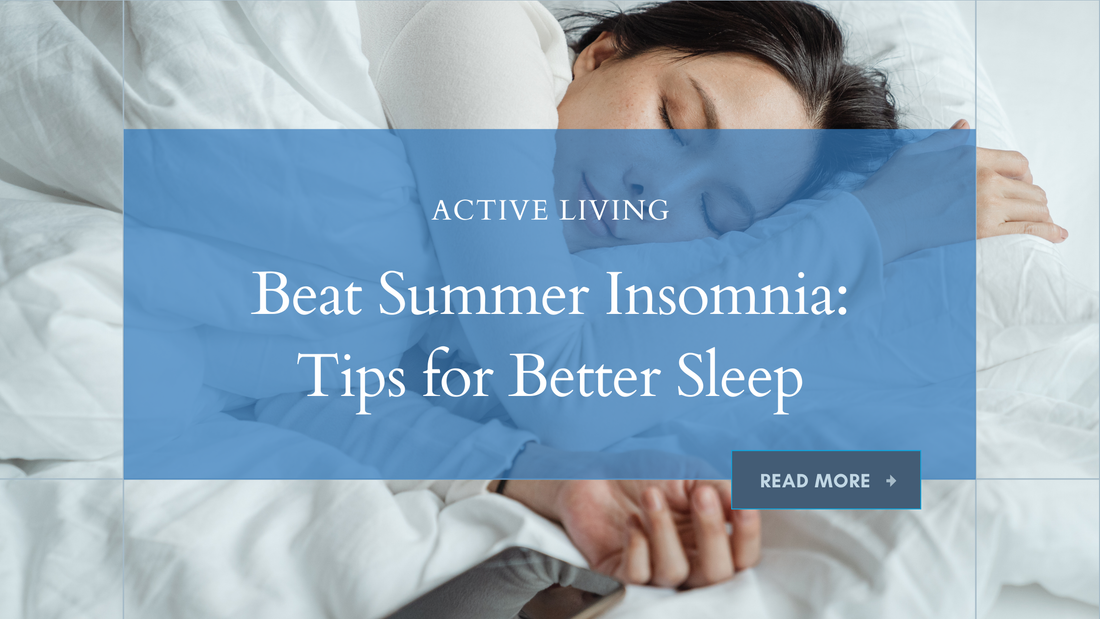Long, sunny days can be a warm welcome after a harsh winter. But do you find it hard to sleep at night? It’s like a cruel summer joke – insomnia in the summer can leave you feeling exhausted when you want to get outside and play.
Many struggle with insomnia because of longer, lighter days with warmer nights. Too much tossing and turning instead of drifting to dreamland. Let's see how we can conquer summer insomnia.
Table Of Contents:
- Why We Experience Insomnia in the Summer
- Practical Tips: Putting Insomnia in the Summer to Bed
- FAQs: Insomnia in the Summer
- Conclusion
Why We Experience Insomnia in the Summer
If you understand your sleep disruptors, you can tackle them more effectively.
The Sneaky Culprit: It's All About Light
As the days get longer and brighter, our bodies produce less melatonin, the hormone that regulates our sleep-wake cycle, also known as our circadian rhythm. Research shows that exposure to light later in the day increases those unwelcome nighttime wake-ups. It also decreases our deep, restorative slow-wave sleep.
Melatonin is naturally produced in response to darkness. Our internal clock gets tricked by the extended daylight hours, thinking it’s still daytime. And because most of us aren't adhering to strict pre-sleep digital detoxes (guilty as charged), we are exposed to even more sleep-disrupting artificial light.
Those glowing screens emit blue light, a big offender when it comes to melatonin suppression. This means even less melatonin makes falling asleep feel like a marathon.
Temperature's Role in Sleep Disruption
Hot, sticky nights are the worst. They can seriously disrupt our circadian rhythm and sleep.
To initiate and stay asleep, our bodies need to lower their core temperature. This drop in body temperature, triggered by melatonin, is essential.
So what's the big deal about being warm? If your bedroom is too hot, it messes with your body's ability to cool down, making falling asleep and staying asleep harder. It's basically like trying to fall asleep in a sauna — not exactly the most relaxing scenario.
According to the CDC, your bedroom temperature should ideally be 65–68° Fahrenheit for the best sleep. Easier said than done in the middle of July, am I right?
Those Summertime Sleep Habits
All those fun summer activities can mess with our sleep routines. And our sleep routines impact our ability to cope with insomnia in the summer.
It's 5 O'clock Somewhere, Right?
Sipping a refreshing margarita on a warm, long summer evening is one of life's little pleasures. However, research suggests drinking alcohol close to bedtime is linked to poor sleep.
That’s because alcohol can mess with our sleep cycles, particularly the restorative power of REM sleep. You might fall asleep faster, but you miss out on quality deep sleep that leaves you truly refreshed.
The Summer Slump
Our eating and exercise habits also tend to take a vacation in the summer. Who wants to be stuck inside the gym or slaving over a hot stove when it's beach weather?
Researchers analyzed sleep patterns in Ghana, which sits near the equator (minimal variation in daylight hours), and Norway, which is way up north and experiences extreme variations in daylight.
What they found was fascinating: people in both places get less sleep on summer days. You can read the results of this comparative sleep study yourself.
Even without major differences in the number of daylight hours, the routines of people in Ghana were impacted during the summer. This change in habits plays a more significant role than previously thought. Skipping workouts or loading up on barbecue can also affect sleep quality. We may be having fun, but our bodies are paying for it.
Practical Tips: Putting Insomnia in the Summer to Bed
Okay, that was a lot about why insomnia in the summer happens, but you're here for solutions, right? Implementing just a few tips can dramatically impact your ability to get a restful night's sleep — even on the hottest days of the year.
Tweaking Your Sleep Environment
You want your bedroom to be your sanctuary. Imagine a cool, dark cave, perfectly suited for sleep.
Embrace the Darkness
Investing in blackout curtains to block out every sunlight is key to increasing melatonin production and signaling to your body it's time for sleep.
Another effective way to block light is using an eye mask. An eye mask blocks out all light, and studies show they lead to better sleep. They can even improve your alertness the next day by ensuring you enjoy adequate slow-wave sleep.
Turn Down the Heat
Experts suggest a nice, relaxing hot bath or shower a few hours before you hit the hay. This helps cool your body temperature for more restful sleep.
Consider investing in a fan. It’ll not only keep you cool but also help with air circulation, especially helpful if allergies tend to act up in the summer.
Don't underestimate the impact of what you sleep in. Light, breathable pajamas made from natural materials such as cotton can be incredibly helpful. And let’s face it, who doesn’t love soft pajamas?
It’s actually scientifically proven. Sleeping in clothes made from natural materials like cotton can even help people get to sleep faster. You may also want to look at your mattress. A mattress that retains heat can worsen insomnia in the summer.
Consumer Reports tests have confirmed that good ol' spring mattresses tend to be cooler than newer memory foam or latex options. If you consistently overheat while you’re sleeping, you will end up having a shorter sleep duration, less deep sleep, and lower overall sleep efficiency. You’ve got to find a way to cool down while you snooze.
Control Humidity Levels
And a little insider tip? Did you know the ideal indoor humidity level is somewhere between 30% and 50%? Maintaining these optimal humidity levels with a dehumidifier or a good ole' wall-mounted humidistat will improve your indoor air quality by cutting down on things like dust mites, mold spores, and mildew growth. Breathing easier helps you sleep better.
Resetting Your Internal Clock: Consistent Sleep-Wake Cycle
Sticking to a regular sleep schedule – even on weekends – can do wonders. Aiming to wake up and go to bed at the same time daily (within the same 30-minute window) can help your internal clock predict sleep time.
Embracing a Pre-Sleep Routine
Who doesn't love a little wind-down time? Incorporating relaxing activities before bedtime can improve your ability to drift off with less effort.
- Taking a warm bath: Remember the science we talked about? That little spike in your body temperature before bedtime helps.
- Reading a physical book: Choose an old-school, printed book rather than an e-reader. This minimizes your exposure to sleep-disrupting blue light before bedtime. Bonus points for losing yourself in a captivating read and forgetting all about the day’s stresses.
- Deep breathing exercises: Just 5-10 minutes can relax your mind, quiet those racing thoughts, and signal to your body that it's time to sleep.
- Meditation: If you’re new to it, there are many resources and apps available. Just a few minutes of focused meditation can make all the difference.
- Calming Yoga Poses: Gentle stretching before bed is a lifesaver. It promotes physical relaxation and releases all the tension from the day, prepping your body for rest.
A soothing pre-sleep routine should cue your body to initiate a sense of calm naturally, encouraging sleepiness, and leaving you feeling completely prepared to embrace slumber. Make sure these pre-sleep activities are done in relaxing spaces in your home.
Diet and Exercise: Fueling Your Body's Sleep Cycle
It may seem unrelated, but what you consume (and when) directly affects sleep. Ever had a caffeine-fueled sleepless night? You feel that. Cutting off your caffeine intake by the early afternoon or even sooner allows your body adequate time to process and eliminate caffeine.
Stay well-hydrated. Dehydration wreaks havoc on sleep by interfering with your natural hormone production. Remember how important melatonin is for a solid night’s rest?
You may be surprised to know that while exercise is a superhero in the sleep department, late-night workouts may hinder sleep rather than promote it. It's best to avoid strenuous exercise at least three hours before bed because it can interfere with the natural dip in your body temperature, making falling asleep a challenge.
I mean, you’re fine enjoying some leisurely exercise later in the evening, but nothing high-impact. Listen to your body. If you feel energized from that late afternoon workout – scale it back or bump up your cool down.
Seeking Professional Help
Sometimes, even when we try all the strategies, insomnia can be a stubborn beast to tackle alone. There’s no shame in asking for support.
Consider a Sleep Study
Millions struggle with sleep disorders that could contribute to summer sleep issues.
Exploring Alternative Therapies: Hypnosis for Insomnia in the Summer
Are you intrigued? When traditional approaches haven’t yielded the desired results, many people report success using therapies such as hypnosis to address chronic insomnia.
A 2018 scientific review showed half of the two dozen studies on hypnosis found real sleep improvement in participants. This approach encourages you to develop healthier thoughts and habits surrounding sleep to support overall improved sleep quality. Hypnotherapy is a strategy often used with other sleep improvement approaches, too.
FAQs: Insomnia in the Summer
Why Is It Harder to Fall Asleep in the Summer, Even If I'm Tired?
As the days stretch out, bathed in sunshine, our bodies produce less melatonin, the sleep-regulating hormone. All that light can really mess with our internal clocks.
Plus, it's not just sunshine, right? Those sneaky electronic devices emit blue light, another culprit keeping us awake. Toss in higher temperatures, and voilà, summer sleep struggles are born.
Does Insomnia Only Happen in the Summer?
No way. It can happen anytime. It’s just that pesky insomnia might rear its head a little more often in the summer, and for some of us, those long days and warm temperatures impact sleep. If you deal with sleeplessness more than three times each week for three months, you may be struggling with chronic insomnia.
Conclusion
While experiencing insomnia in the summer can feel exhausting (no pun intended), remember there are ways to combat it. Incorporate one change at a time.
Rome wasn't built in a day. A cool, dark, and serene sanctuary coupled with healthy habits can work wonders. Be patient with yourself; achieving restful sleep is a journey.

